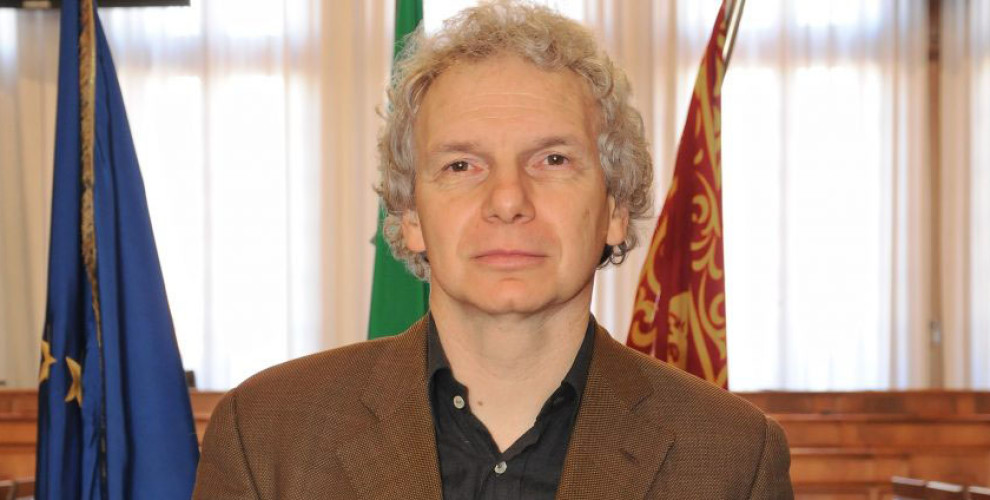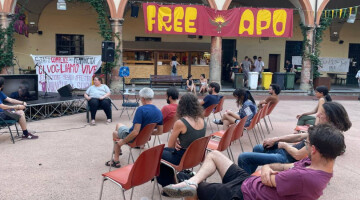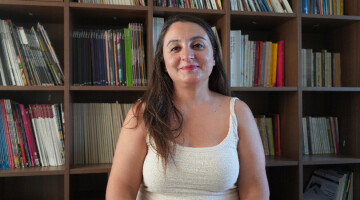Writer and politician, Gianfranco Bettin has for many years been vice-mayor of the city of Venice and head of the Peace Center and Youth Policy.
He has been a promoter of numerous cultural activities that took place in the Italian city such as the Fondamenta Literature Festival.

First of all, can briefly present yourself and tell us when and how you started writing. What is the first memory of you writing?
I was born in Porto Marghera, in the municipality of Venice, in 1955. I have been writing ever since I learned to do it in school, but perhaps even from before that: imaginative things, symbols or drawings that who knows what they meant. The first written thing I remember is a sort of fairy tale, imitation of a Russian tale I had read in one of the first books I've seen in my life (a collection of Russian fairy tales). I only know that I wrote it, though. I do not remember anything else, maybe there was snow and a fire, with a small magical and half-vagabond character
Veneto is a complex region. Very Cristian Democratic (except some red spots), but also a region with important universities and many factories. It is the region of the so called northeastern "miracle" and decline, of the labor and political struggles of the left, the dark mysteries, the brutal "family" murders, the Brenta mafia ... There is much Veneto in your narrative. What aspects did you try to emphasize? How much being a sociologist on the one hand and political on the other influenced your subjects choice?
My training in social and political science certainly weighs and affects my way of writing and telling, but, before that, of looking at things. It is a mixture of analytic deciphering and intuitive understanding, which translates into sometimes suggestive and sometimes descriptive phrases. I hope they merge well... With this look and instruments, of the world I have lived in, especially between Veneto and Marghera-Venice, I have always tried to grasp at the same time the dark, shadowy sides (hypocrisy, connivance and complicity with powers, sharing of prejudices, some latent racism, tolerance to politics even when regressive as long as they acquiesce to widespread selfish interests, the inability to put limits on deregulated, destructive, pervasive development, etc.) and the luminous aspects, which are present in large numbers (from landscape to cultural assets to the social and personal characters of many people that you can encounter).

You have been vice-mayor of the city of Venice for many years, an interesting and contradictory experiment of what "could" be an important laboratory for the Italian left. An old friend, on his nineties who had an anarchist bookshop in Venice, told me about the enthusiastic encounters taking place in his library near the Frari. All the intellectuals and most important artists of the city had passed through it. Venice is the one of the Biennial of 1968, but also that of the bad choices of De Michelis... When and why Venice stopped focusing on being a political laboratory (which, inter alia, meant being at the same time an ”intellectual" artistic city and a working city) preferring the quasi-Disneyland option?
In fact, two Venice have lived together for almost half a century. One was trying to abandon itself to modernity that brought easy profits, especially when it comes to tourist offerings, speculation and resources related to the great work under construction, like the Mose (with all the consequent corruption). The other sought different ways, depending on the people and the times. At a stage dating from the early 1990s to the beginning of the next decade, it also tried to be a political laboratory. At one point though it just couldn’t make it anymore, yielding to more traditional and less innovative policy formulas, which we could call moderately centre-left and without audacity, without the ability to integrate political innovations and respond to the demands that local and national society produces. Paving so the way for a political regression of the liberalist and selfish type currently in progress.
You were elected when basically this choice - Disneyland instead of political laboratory - was already under way. What do you think the Cacciari’s governments lacked in order to reverse the course?
It was only partly a problem of city council. In reality, much of the fate of Venice is dependent on other powers, especially in the economic and the spheres of competence, powers stronger than the City Council (Regional and National Government, Parliament) and External Authorities, such as the Port Authority, Water Magistrate, Superintendence etc. or other very powerful private subjects, such as the New Venice Consortium and the airport managing company or cruise companies. As far as its powers are concerned, the City Council has nevertheless not been able to involve the city as a whole against the damages caused by these powers, nor has it been able to affect the ruthless cuts to local resources imposed by central governments and the further detachment of skills that has been produced over time. So, the biggest limit I see is indeed in this inability to integrate institutional initiative and administrative developments with a social dynamic, a path of participation and sharing of choices, which is a serious political limit.
Veneto, as we have already said, is a very complex region. You chose to tell on one side the Veneto of the marginalised (Qualcosa che brucia, Something Burning), without overlooking the difficulty of telling even the darker Veneto, that of Pietro Maso for example, or a rejected but necessary immigration (necessary for the bosses). How do your books come around? How do you choose the story to tell? Do characters come first, or plot? Let’s talk about your creative process.
Stories and characters that I decide to tell are from a rich set of notes, sometimes even mental ones, which I keep in written form, or not, for a long time, observing reality or imagine imaginative developments in a creative, arbitrary way. If I write about real things, as in the narrative inquiry on Pietro Maso (a boy who, with some peers, killed his parents to dispose of the inheritance, a crime that shocked Italy in the early 1990s), I would keep a rigorous look at facts and data, and if I push further, I state that at that point of the story I imagine, but mostly I remain loyal to the reconstruction that I could do both with data and facts and by immersing me in places and situations, in the context even physical as well as cultural, where the story has taken place. Of course, in the novel I feel more free but, in this case, more tied to the effectiveness of the word, the choice of every single word and phrase and even point or comma and spacing. The novel is all there, it is made of these things, its credibility is born from this and not so much from the truthfulness of data and facts, as in the narrative inquiry on real events. I follow many leads while writing novels or essays or narrative investigations, I also nurse the subject for a very long time, holding a sort of literary mine to draw on. This allows me to always write about one thing or the other. Then, finally, a story calls me "more than others” and then I dedicate myself to it, conclude it and, in case, publish it.
How important is the language in your narrative?
As in any piece of writing, it is the most important thing of all.
You (intellectual and politician) have been creating an interesting cultural and literary space in Venice. In the '90s, you sponsored a series of interesting meetings with and for new Italian writers (I think of Tiziano Scarpa, Ferrucci but also the Turin bunch). Later on, you organised the Fondamenta Festival. Despite Berlusconi this was a country (and Venice was certainly a very lively city) that still produced good literature and generally good cinema, good culture and good music. But the 2000s the light kind of faded away, and now? Do you see light at the bottom of the tunnel?
This is for Venice the most difficult time for at least half a century. It does not mean that there are no ferments in many fields, including the cultural and even the political one, but to date they are ferments that do not find significant representation and that certainly are not present in the government of the city. However, it may be that this favours a horizontal propagation, a more free, more selective, and therefore more powerful growth. That, in short, the ferments themselves bring some light ... despite everything. It is certain, however, that the experiences of those years are unrepeatable, both because they are overcome and because their genuine and fruitful search for new roads has finally opened those roads but has, for that very reason, consumed them. Take us to the point from where we need to go further. As for me, I do not see much difference between being an intellectual and being a political activist.
What are your "literary references" and more in general your cultural references?
In my formative mix there is a bit of everything, even though I think the literary references prevail (Italian classics, some literatures: mostly Russian and American, then French, Iberian and English), comics (at the beginning Italian and American, then stripes and graphic novel) and cinema (Kubrick on all, then western, noir, science fiction, the latter also in literature). Music is often an indispensable corollary, although it is not always an inspirational source.
How would you define the state of health of Italian literature?
In recent years I would say good enough, many good authors have emerged, even original ones.
And the publishing house policy? Are they just pointing to "safe" titles or is there someone who takes "risks"?
Small publishers risk more, but they are also more and more in a difficult situation when it comes to get involved in a market and distribution that points to the immediate success of the "safe”, or allegedly such, title. It is less common to see a big publisher taking risks.
Literary and more in general cultural magazines are virtually disappeared. Why? Was it really a market problem?
It's a market problem, which means, a distribution problem, but it is also a problem of readership. Today, there is a more horizontal circulation of ideas, thanks to the network, faster, more efficient, and cheaper. This puts out the game magazines, or pushes it to become a web site, a blog etc., and in the end to abandon its paper format, even because of the cost and, often, the ineffectiveness of the format. Fortunately, this does not prevent the circulation of ideas. On the contrary.
Italy for years has not been investing in culture (nor education). What can be done to reverse this trend before it's too late? Or is it already too late?
It's not too late, but it's late. In addition to doing what we can with books, texts, websites, even magazines where they resist, etc., the decisive question is whether we are able to develop a political movement capable of changing the country's government and therefore changing priorities, thus setting as priority education and culture (an issue, among other things, that could be a formidable economic opportunity for a country like Italy).

















